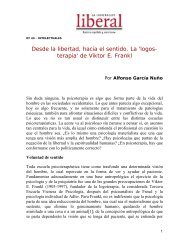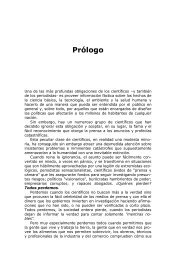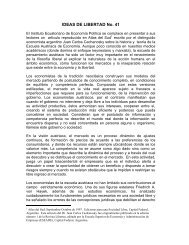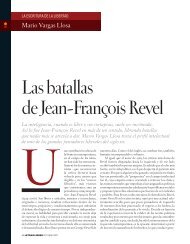Darfur: Blueprint for Genocide - Archipielago Libertad
Darfur: Blueprint for Genocide - Archipielago Libertad
Darfur: Blueprint for Genocide - Archipielago Libertad
Create successful ePaper yourself
Turn your PDF publications into a flip-book with our unique Google optimized e-Paper software.
4.1.4 Civil war and rebels<br />
The rebels appear to have been the only actors in the<br />
conflict aw are of the imperative of civilian security . MPs<br />
within <strong>Darfur</strong> were calling <strong>for</strong> <strong>for</strong>eign intervention in<br />
December 2003; rebels requested higher numbers of<br />
monitors from the outset of the Ceasefire Commission and<br />
in July rebels called <strong>for</strong> <strong>for</strong>eign military intervention. It has<br />
been slow in coming and is still insufficient. Consequently,<br />
during October and early November peace talks were<br />
deadlocked ov er the security issue. Although the SLA and<br />
JEM signed Humanitarian and Security Protocols w ith the<br />
GoS on 9 November follow ing talks in Abuja, this provides<br />
minimal cause <strong>for</strong> optimism; Sudanese security <strong>for</strong>ces<br />
display ed contempt <strong>for</strong> the agreement by conducting a raid<br />
on IDPs at the El-Geercamp the following day.<br />
If there are no plans to protect the vulnerable, it is not<br />
sensible to stop the victim group from defending itself in a<br />
genocidal situation. If security is not provided, ceasefires<br />
may decrease, not increase security<br />
<strong>for</strong> the vulnerable. This is the key<br />
difference from a conflict w here<br />
genocide is a low risk.<br />
In Rwanda in 1994, it w as the then<br />
rebel group, the Rwandan Patriotic<br />
Front, that stopped the genocide.<br />
Not the UN peacekeepers, not the<br />
Arusha peace deal. That lesson<br />
should also have been learned from<br />
Bosnia. An arms embargo imposed<br />
on Yugoslavia in 1991 left the poorly<br />
armed Bosnian Muslims unable to<br />
obtain arms to defend themselv es against the well armed<br />
Serb <strong>for</strong>ces. Under Resolution 819 (1993), which created<br />
the ‘safe area’ of Srebrenica, UNPROFOR (United Nations<br />
Protection Force) troops disarmed all Muslims within the<br />
safe area. This was the condition laid down by the Serbs<br />
<strong>for</strong> ceasing attacks on the area. It w as also UN action that<br />
left the Bosnians vulnerable to the subsequent occurrence<br />
of genocide in Srebrenica inJuly 1995.<br />
We are repeating thesemistakes in <strong>Darfur</strong>.<br />
4.2 International response to security<br />
Sending Western troops to Sudan w ould have been<br />
inappropriate under the best of circumstances. After the<br />
inv asion of Iraq howev er, it became politically<br />
inconceivable <strong>for</strong> Western nations to consider entering the<br />
sovereign territory of another Muslim state. Ironically,<br />
while the recent w ar in Iraq remains difficult to shoe-horn<br />
into legality, there is little question that international law<br />
would allow member states to interv ene to protect human<br />
‘In a genocidal<br />
situation…<br />
ceasefires may<br />
decrease, not<br />
increase security<br />
<strong>for</strong> the<br />
vulnerable.’<br />
Section 4: Security<br />
life under threat of genocide in Western Sudan. Political<br />
nerv ousness about where an intervention may lead, and<br />
strong opposition from Arab states and China, contributed<br />
to the issue of security being av oided as much as possible.<br />
As a result, v iable alternatives to providing protectionwere<br />
not considered carefully or early enough.<br />
Yet the need <strong>for</strong> security to be a top priority was clear and<br />
was confirmed in a report by the UN Inter-Agency Rapid<br />
Assessment Fact Finding Mission in April 2004. It reported<br />
instances where starv ing IDPs were asking not to be given<br />
humanitarian assistance, fearing that receipt of<br />
humanitarian aid would make them targets of the<br />
Janjaweed in and around the IDP camps. Yet it was not<br />
until July that the need <strong>for</strong> an international security<br />
presence was recognised in a UN resolution.<br />
Instead, the UN and member states hid behind the<br />
humanitarian aid ef<strong>for</strong>t, which w as also needed to save<br />
liv es. For ex ample, in the UK the Secretary of State <strong>for</strong><br />
International Development, Hilary<br />
Benn, was the main Government<br />
spokesman on the issue. He<br />
undertook his aid role with great<br />
generosity, but deftly avoided<br />
questions about security or the<br />
political process. The Foreign<br />
Secretary and his ministers kept a<br />
low profile behind Hilary Benn and<br />
barely uttered a word until July 2004.<br />
The joint FCO-DfID Sudan Unit knew<br />
that security was needed in <strong>Darfur</strong>,<br />
as well as food, but they equally<br />
understood that leading the rest of<br />
the reluctant Security Council members to such a position<br />
was a steep, uphill task, especially as the Iraq problems<br />
diminished any moral high ground held by theUK andUS.<br />
4.2.1 The AU <strong>for</strong>ce<br />
A tiny ex ternal military presence was finally established in<br />
Western Sudan, after months of killing, rape and<br />
dev astation. 154 Rwandan troops arrived on 14 August<br />
and 153 Nigerian troops on 30 August – to protect AU<br />
observers.<br />
The need to protect citizens was understood more in the<br />
African Union than it was among the wealthy member<br />
states. Reflecting on the experience in his own country,<br />
President Kagame of Rwanda said that whatever mandate<br />
was given, his soldiers would not stand and watch civilians<br />
being killed. On the 27 th July the AU Peace and Security<br />
Council passed a resolution which called <strong>for</strong> a proposal to<br />
be made <strong>for</strong> trans<strong>for</strong>ming the observer protection <strong>for</strong>ce into<br />
a fully fledged peacekeeping mission, with the requisite<br />
22



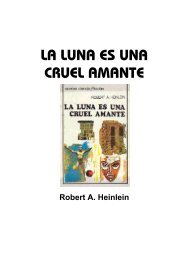
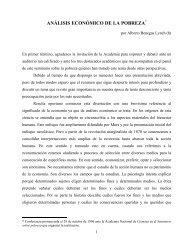
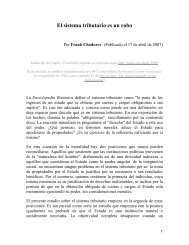
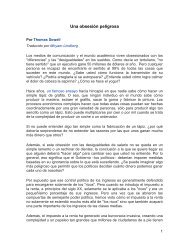
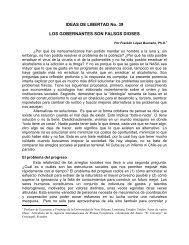
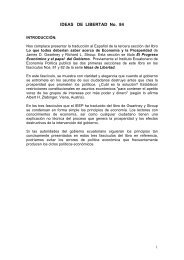
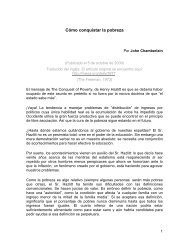
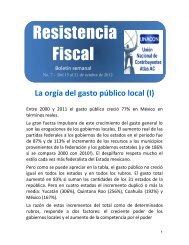
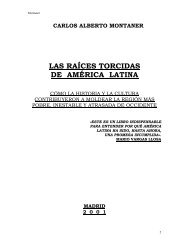
![0091 Stewart - La magia y el misterio del comercio [parte I].pdf](https://img.yumpu.com/16943279/1/169x260/0091-stewart-la-magia-y-el-misterio-del-comercio-parte-ipdf.jpg?quality=85)
